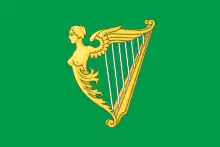Carnew executions
The Carnew executions refer to the summary execution of 28 prisoners being held as suspected United Irishmen by yeomanry troops from the Carnew garrison stationed in the barracks of Carnew Castle, County Wicklow, Ireland on 25 May 1798.[1][2]
| Carnew executions | |
|---|---|
| Location | Carnew, County Wicklow |
| Date | 25 May 1798 |
Attack type | Firing squad |
| Deaths | 28 |
| Perpetrator | Irish Yeomanry |
Background
The Society of United Irishmen having failed to advance its aims of Catholic emancipation and parliamentary reform by political means, instigated a rebellion against British rule in Ireland.[3] The rebellion took place in May 1798, but the only significant uprisings outside of the province of Ulster occurred in counties Wicklow and Wexford, both south of County Dublin. The rebels were met with a swift response from the Dublin Castle administration and the bulk of the rebellion was suppressed within a year.[1]
Executions
By the morning of the 25 May, news of the long-expected outbreak of the 1798 rebellion in neighbouring County Kildare and of military losses in the battles of Ballymore-Eustace, Naas, and Prosperous had reached the garrison in Carnew, who decided to take preventative measures by assembling the rebel suspects in detention. The suspects were marched from Carnew Castle to the local handball alley and executed by firing squad (consisting of yeomanry soldiers) as a warning to the local populace.[2]
References
- Thomas Bartlett and Keith Jeffery. A Military History of Ireland Cambridge University Press, 1997; ISBN 0-521-62989-6, p. 279
- Gwynn, Stephan Lucius (1915). Famous Cities of Ireland. p. 275.
- "Society of United Irishmen profile". Encyclopædia Britannica. Retrieved 10 December 2015.
